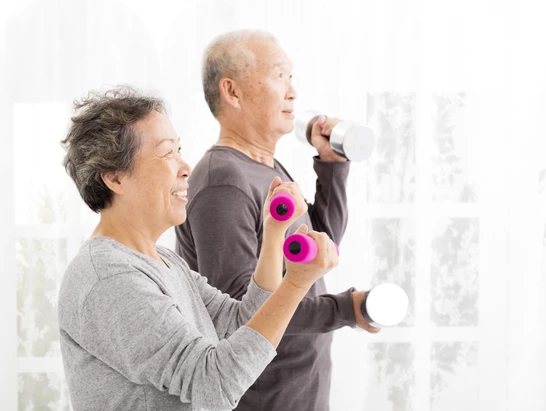Is it safe for older adults to exercise?
Medicare Benefits
Most seniors over the age of 65 can safely exercise, even if they have mobility challenges and chronic conditions. Before starting any exercise program, you must talk with your doctor to determine which exercise options suit your activity level and health. Then, you can experience the immense and proven health benefits of exercise firsthand.
Fitbit Watch to Track Heart Rate and Calories
Heart rate monitoring and tracking metrics, including distance, calories burned, and pace!
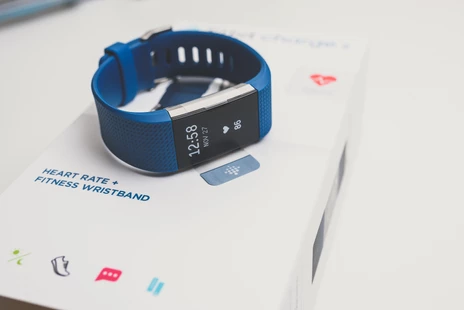
Exercising can prevent bone loss in seniors. If your bones are stronger, they are harder to fracture and can help you with your balance. If your fall risk is lowered, your life expectancy is greater, as is the quality of your life.
Which Exercises are Good for Seniors?
The optimal exercise routines for seniors should incorporate flexibility/stretching exercises, strength training, and aerobic exercise. High-intensity workouts are not recommended for most older adults. Here are some excellent options for activities for Seniors:
Yoga
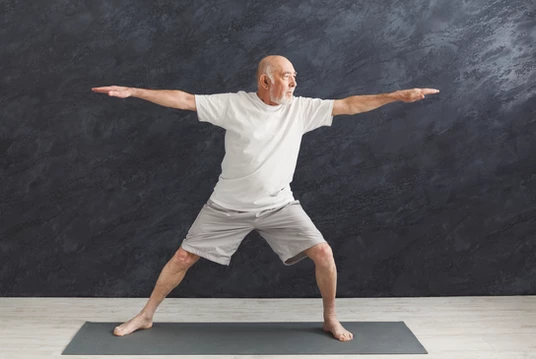
Yoga is a low-impact exercise that does not strain your joints. However, it does build muscle, increases your flexibility, strengthens your bones, and stabilizes your core. Look for beginners yoga classes designed specifically for seniors, as they usually incorporate chair yoga and standing options.
Pilates
Pilates, like yoga, offer an effective workout while going easy on the joints. It is focused on improving stability and balance and has been demonstrated to reduce symptoms of multiple sclerosis (MS), arthritis, and Parkinson’s disease. Commonly, the exercises are performed in a reclining or sitting position. They are a smart choice if you haven’t exercised in a long time.
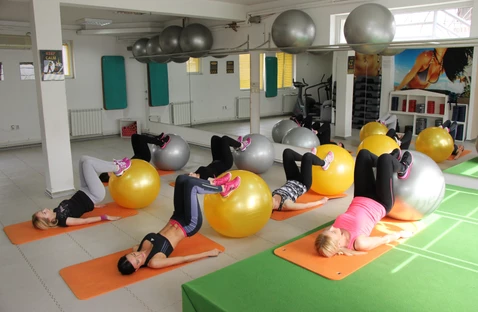
Aerobic Exercise
Adding aerobic activity to your exercise routine can boost your cardiovascular function, strengthen your lungs, and enhance your daily stamina. The recommended time for aerobic exercise is 30 minutes per day. You can break it down into three 10-minute sessions spread out over your day. Swimming, walking, and stationary biking are all excellent choices for aerobic exercise.
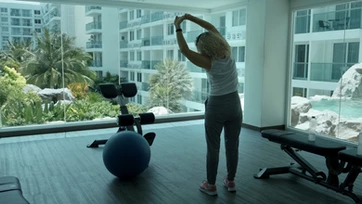
Get Your Gym Membership for Free With the Right Medicare Plan
Relieves Osteoarthritis Pain: Believe it or not, exercise can help to reduce the stiffness and pain of arthritis. Arthritis-friendly exercises include low-impact exercises, stretching, and range-of-motion exercises. Exercise lessens the pressure of joint pain and stiffness by making surrounding muscles stronger. Exercise can help lubricate your joints and ease inflammation.
Helps Prevent Chronic Disease: Exercise is heart-smart and can protect you against many chronic illnesses, such as diabetes, hypertension, colon cancer, and heart disease. If you already suffer from a chronic condition, exercising can minimize your symptoms. Research has demonstrated that participants over the age of 60 who exercised 30 minutes per day had fewer Alzheimer’s disease biomarkers.
Home Workout Videos Through the Right Medicare Plan
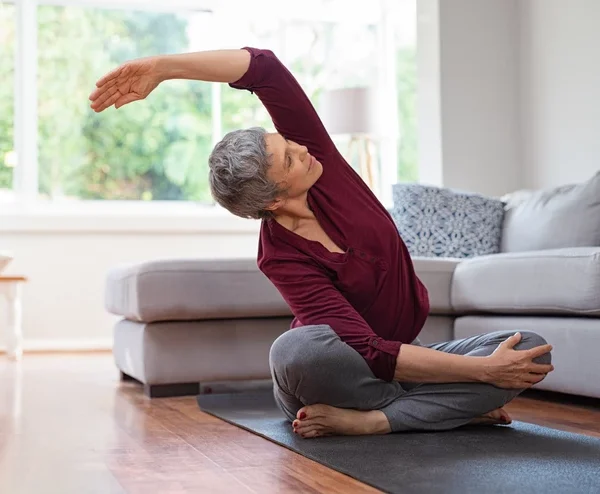
Move Those Hips Home Exercise: It comes as no surprise that your hips are extremely important to your mobility. If your hip muscles are weak or tight, it can affect your walking, sitting, and many other abilities. Stiff hips are more than just uncomfortable, they can put you at a greater risk for injury. For this exercise, take it easy and go at your own pace.
Side-to-side lunge: Stand, knees bent, and feet wide apart. Lean forward without hunching your back or shoulders. Slowly lung to the left and then to the right. Alternate slowly for eight lunges to each side.
Balance Improvement Exercise: Balance is extremely important to your health. It is imperative to build up to improved balance so you can feel more confident without risking stumbling or falling. For this exercise, you need a sturdy chair and some open floor space. Remember to stay hydrated.
While placing your hands on the back of the chair go up and down on your tippy-toes ten times. Then stand on one foot (holding on the chair) for a count to ten and then switch to the other foot.
Calf Stretches for Better Balance Exercise: If your calves are tight, it can affect your balance. Your calves help you to maintain your posture by stabilizing your ankles and supporting the larger leg muscles. For this exercise, you will need a sturdy high-back chair or the wall, or a counter.
Stand with your hands on the back of the chair or against the wall. Split your stance by stepping back with one leg. Stretch far enough to feel it in your calves and hold for 15 seconds. Next, step back with the other leg, far enough to feel it pulling in your calves, and hold for 15 seconds.
Lower Back Exercise: Lower back pain is one of the most common complaints about seniors. Daily stretching your back can loosen your muscles while at the same time relaxing your mind. You will need a sturdy chair and some floor space.
Stand with your hands, palms flat, on the seat of the chair. Rock your head forward while tucking your belly in and arching your back. Hold for 10 seconds and then flatten out your back. Repeat this exercise 5 times.
Why Is it Important to Workout?
- Help you control your weight: Along with diet, exercise plays a vital role in preventing obesity and controlling your weight. The calories you eat and drink must equal the calories you burn to maintain your weight. If you want to lose weight, you have to use more calories than you consume.
- Reduces your risk of heart diseases: Exercise improves your circulation and strengthens your heart. When your blood flow increases, the oxygen in your blood increases, lowering your chances of heart diseases, such as coronary artery disease, high cholesterol, and heart attack. It also works to maintain healthy blood pressure and lowers triglycerides.
- Help your body manage blood sugar and insulin levels: Exercise can help your insulin function better and help lower your blood sugar levels.
- Improves your mental health and mood: During exercise, your body releases feel-good chemicals that help to improve your mood and make you feel more relaxed. This can help you manage stress, lower your anxiety levels, and reduce your risk of depression.
- It helps keep your learning, thinking, and judgment skills sharp as you age: Exercise stimulates your body to release proteins and other chemicals that improve the structure and function of your brain.
- Reduces your fall risk: Research indicates that exercise strengthens your muscles and improves balance when combined with walking can lower your risk of falling.

